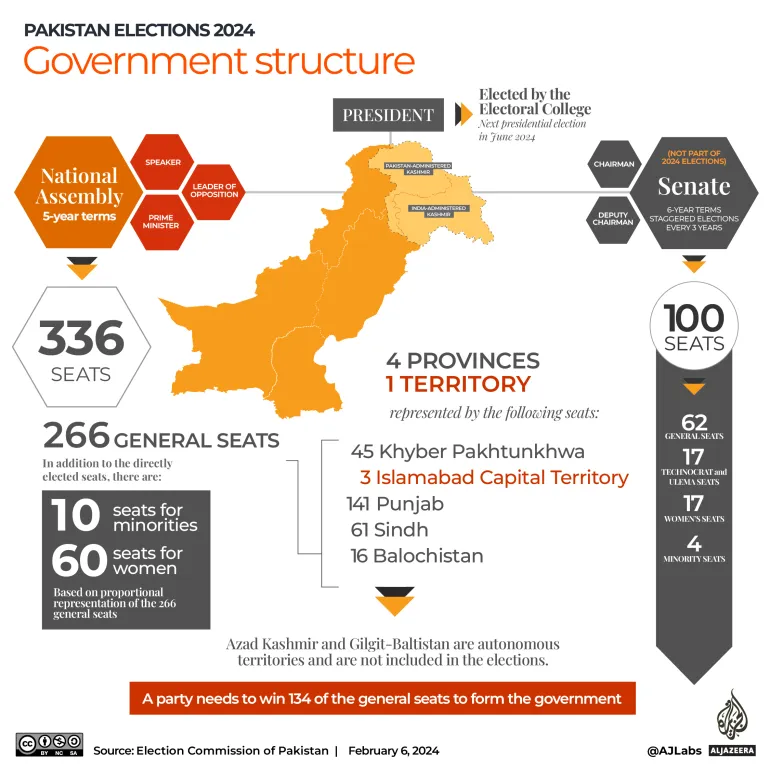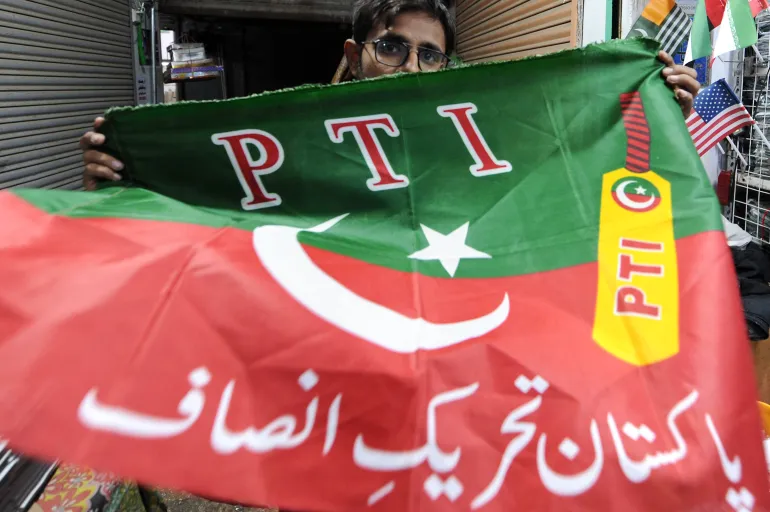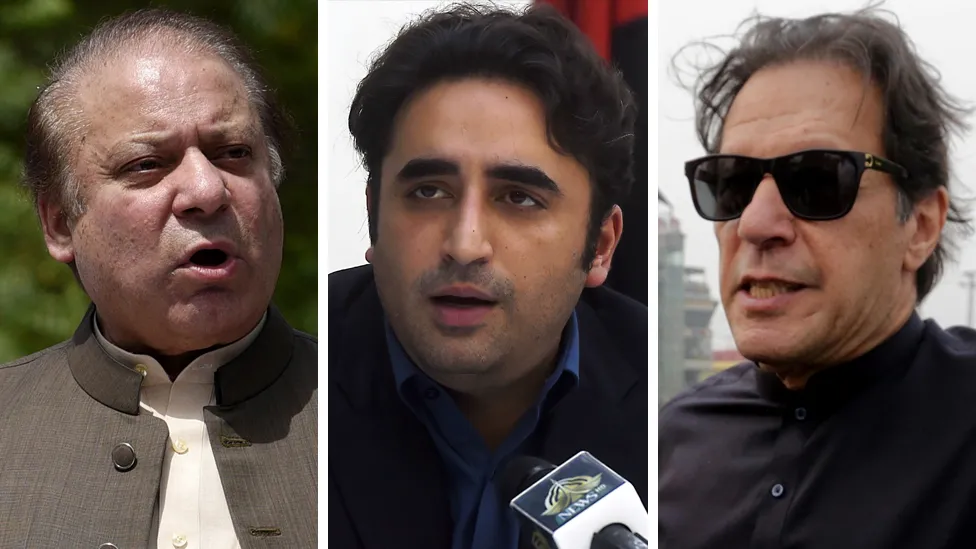News Asia
The Next Government in Pakistan is Still Unknown 5 Days After Election

(CTN News) – Five days after the February 8 elections, Pakistan is still unsure which parties will form the next government and who will serve as Prime Minister.
The elections resulted in a split mandate despite concerns about the impartiality of the environment in which they were held, allegations of major manipulation, and three-day-long disputes about the integrity of vote counts.
Candidates linked with former Prime Minister Imran Khan’s Pakistan Tehreek-e-Insaf (PTI) are leading with at least 96 seats despite contesting the election as independents without their electoral symbol, the cricket bat.
They are followed by the Pakistan Muslim League-Nawaz (PMLN) of three-time ex-Prime Minister Nawaz Sharif, which has won 75 seats and is theoretically the single-largest party in the National Assembly, despite winning less than a third of the 266 seats up for grabs on February 8th.

The Pakistan People’s Party (PPP), led by former Foreign Minister Bilawal Bhutto Zardari, comes in third with 54 seats.
But can the PTI-backed independents establish or join a government? What are the party’s alternatives, and what happens next in the country?
To create a government, a party or coalition must secure a simple majority of 134 seats out of the 266 that were voted on in the National Assembly.
A coalition can consist of various parties or independents who have won seats.
Those independent candidates can either formally join a party seeking to form a government or forge an agreement with them while maintaining their own identity.
While the PTI-backed independents might theoretically form the core of a government in coalition with other parties to reach the 134-seat threshold, this approach presents significant hurdles.
First, maintaining stability would be challenging. A government based solely on independent legislators is vulnerable to defections and collapse.
Second, as a collection of independents, the PTI bloc would lose access to a portion of the 70 seats earmarked for women and minorities, proportionally distributed among parties represented in the National Assembly.
However, if PTI-backed independents joined another party, they would be subject to the discipline of that parent party, thereby jeopardising their capacity to operate by the PTI’s ideas and strategies.
According to Basil Nabi Malik, a Karachi-based lawyer, the constitution requires that a new National Assembly session be called within three weeks of the elections.
“The law clearly states that the National Assembly shall meet on the 21st day following the day on which the election to the assembly is held, unless sooner summoned by the president,” said the official.
Unless President Arif Alvi calls the session sooner, the 21-day period will end on February 29.
On the day of the session, if the parties have finalised their allies and agreed on a coalition, house members will be invited to vote for the prime minister, speaker, and deputy speaker.
An opposition leader will also be chosen from the parties that have decided not to sit on the treasury benches.
PMLN supremo Nawaz Sharif stated in a speech from the party’s headquarters in Lahore on Friday that he had directed his brother Shehbaz Sharif, a former prime minister, to reach out to other political parties that had won multiple seats in the election to establish a governing alliance.

The PMLN leadership has already met with PPP counterparts and Muttahida Qaumi Movement (MQM) representatives, who won 17 seats in Sindh province.
Still, the parties have not announced whether they intend to ally or any coalition’s contours.
Meanwhile, the PTI has centred its protests on the manipulation of alleged election results.
The party leadership maintains that the actual results of a substantial number of their seats were altered, denying their candidates victory and keeping their seats under the magical figure of 134.
Sayed Zulfikar Bukhari, a senior PTI member, firmly stated that they will not collaborate with any major political parties.
“Our internal party discussions and consultations are ongoing, and we have many options on the table,” he was quoted as saying by Al Jazeera. “A decision to join a party will be made very soon, but it will not be one of the three or four major parties.”
The National Assembly elections saw 13 parties win at least one seat, with six securing a single seat.
If PTI-backed candidates opt to join another party, they must do so within three days of announcing the official results of the Election Commission of Pakistan (ECP). The ECP has yet to release the official results.
Kanwar M Dilshad, a former ECP secretary and analyst, said the PTI-backed independents might form a new party in theory, but the registration procedure could take a few days.

13 Parties, 266 Seats: Navigating the Political Landscape
However, this will not aid the PTI in forming a government because no new party would have participated in the current election.
Malik, a Supreme Court counsel, agreed with Dilshad’s assessment: PTI-backed independent candidates can form a new political party, but this will not impact the formation of the upcoming administration.
“It is [also] questionable as to whether such a political party, established after the elections, shall enjoy the constitutional protections enjoyed by other political parties that had been enlisted and registered with the ECP before the elections in question,” he said.
Another senior lawyer, Abid Zuberi, suggested that the independents may declare themselves a ” like-minded ” group. However, such would not be termed a party.
“They can decide on parliamentary matters en masse, but they will be treated as a group of independents, instead of a party, and thus cannot receive the quota of reserved seats,” Zuberi was quoted as saying by Al Jazeera.
While the party’s leader, Imran Khan, has been in jail since August 2023, and they have been subjected to a vast, state-led crackdown since at least May of last year, the most significant blow they have endured is the loss of their electoral emblem.
The ECP accused them of violating the laws governing internal party elections. The party has claimed that this was a choice made to reduce the party’s popularity and influence.
The party could seek a remedy from the country’s Supreme Court, which could reverse the ECP judgement. However, even if the party wins, it is uncertain if the independents it supports will be able to represent the PTI formally in the next National Assembly.
“The PTI must hold an election per the letter and spirit. But I don’t think it will allow the party to be a part of the current parliament since, according to the ECP, it does not exist in terms of election results, said Zuberi, a senior lawyer and former Supreme Court Bar Association president.
Senator Ali Zafar, a senior PTI leader and legal team member, stated that the party was not certain it would receive relief from the Supreme Court over the emblem.
“I believe that the symbol issue is now resolved because it was for the purpose of winning the election. I don’t believe it will have any effect in the post-election environment. Instead, it is an issue of which party the PTI-backed candidates would join,” he told Al Jazeera.
Malik also criticised the ECP’s original decision to remove the sign, claiming that it is unlikely to be overturned anytime soon.
“We also see a lack of urgency in the Supreme Court in fixing this matter for hearing, and it may not be possible to complete this entire exercise before the first session,” he said.
News Asia
Bangladesh Supreme Court to Rule on Controversial Job Quotas Amid Nationwide protests

(CTN News) – The future of public service hiring regulations, which have provoked national conflicts between police and university students that have resulted in at least 133 fatalities so far, is set to be decided by Bangladesh’s Supreme Court on Sunday, or today.
Later in the day, the nation’s highest court will meet to declare its decision about the controversial job quotas—either in favor of or against their elimination.
This week’s protests over politically motivated admission quotas for highly sought-after government posts turned into some of the worst instability during Prime Minister Sheikh Hasina’s watch.
Due to the ongoing turmoil, a curfew has been in place since Friday. In addition, the government has declared a two-day holiday during which all offices and institutions would be closed.
After riot police were unable to restore order, soldiers are now policing cities throughout Bangladesh, and since Thursday, there has been a statewide internet blackout that has severely limited the flow of information to the outside world.
SEE ALSO: Nearly 1,000 Indian Students Return from Bangladesh Amid Deadly Unrest Over Job Quota System

Hasina made hints to the public this week that the plan will be abandoned, which comes after her opponents accuse her government of using the judiciary to further its own agenda.
However, a positive decision is unlikely to calm the nation’s simmering rage in the wake of the intensifying crackdown and growing dead toll.
Business owner Hasibul Sheikh, 24, told AFP, “It’s not about the rights of the students anymore,” while observing a Saturday street demonstration in the capital city of Dhaka against a statewide curfew.
“Our demand is one point now, and that’s the resignation of the government,” he stated.
A system that reserves more than half of civil service positions for particular groups, like as children of veterans of the 1971 war, is the driving force behind the upheaval this month.
Hasina, 76, has ruled the nation since 2009 and won her fourth consecutive election in January following a ballot in which there was no real competition, according to critics who claim the program helps families who support her.

Rights organizations accuse Hasina’s government of abusing state institutions, including as the extrajudicial assassination of opposition activists, in order to strengthen its grasp on power and quell dissent.
Bangladesh’s 170 million people lack access to sufficient employment possibilities, therefore the quota system is a major cause of anger for recent graduates who are struggling to find work.
“The government’s actions have made the situation worse, rather than trying to address the protesters’ grievances,” Pierre Prakash, Asia director of Crisis Group, told AFP.
After a week of increasing violence, Hasina canceled her intentions to depart the nation on Sunday for a diplomatic trip to Spain and Brazil.
Source: The Indian Express
News Asia
Pakistani Government Plans to Ban PTI

(CTN News) – The Pakistani government has announced measures to outlaw Pakistan Terheek-e-Insaf (PTI), the party of imprisoned former Prime Minister Imran Khan.
Information Minister Attaullah Tarar made the declaration on Monday, only days after the Supreme Court declared the PTI eligible for a share of reserved seats in national and provincial assemblies.
After reviewing all relevant information, the government has decided to ban PTI. “We will file a case to ban the party,” he said, citing claims such as inciting violent protests last year and leaking confidential information.
Tarar stated that the case would be moved to the Supreme Court.
He also stated that the government intended to file treason charges against Khan and two other senior party leaders, former President of Pakistan Arif Alvi and ex-Deputy Speaker of the National Assembly Qasim Suri, as well as a review appeal against the Supreme Court’s ruling that the PTI should be allocated some assembly seats reserved for women and members of religious minorities.

According to Sayed Zulfiqar Bukhari, a top PTI politician and party spokesperson, the government’s action “betrays their complete panic”.
“After realizing that they could no longer threaten, compel, or blackmail judges, they decided to make this move through the cabinet. “All of their attempts to stop us have been declared illegal by the courts,” he stated.
Last week, the Supreme Court recognized the PTI as a political party and confirmed that the party’s lack of an electoral emblem did not affect its legal right to field candidates.
The verdict was in response to the PTI being barred from competing in parliamentary elections in February using its party emblem, the cricket bat, forcing it to field candidates as independents.
Despite the setback, PTI-backed candidates emerged as the largest parliamentary bloc, winning 93 seats.
After Khan declined to cooperate with his political opponents, the Pakistan Muslim League-Nawaz (PMLN) and Pakistan People’s Party (PPP) formed a coalition government with other smaller parties.
Ex-Governor Sindh Zubair, who formerly served in the PMLN, stated that the government’s action was in response to the Supreme Court’s ruling last week and warned of political upheaval ahead.
“The powers that be are trying to disenfranchise the largest majority of voters of the country, who voted for PTI,” he disclosed to Al Jazeera.

Khan was appointed prime minister in August 2018 but was dismissed from power in April 2022 after a parliamentary vote of no-confidence.
The cricketer-turned-politician has since faced a slew of legal issues, including charges of misplacing and leaking the contents of a confidential cable delivered to Islamabad by Pakistan’s then-ambassador in the US in 2022.
Khan has continually disputed the charge, claiming that the dossier contained evidence that his resignation as prime minister was orchestrated by his political opponents and the country’s powerful military, with assistance from the US administration. Both Washington and Pakistan’s army deny the accusation.
Despite multiple recent court verdicts in his favor, Khan has been in prison since August of last year.
Source: Aljazeera
News Asia
NAB Re-Arrests Imran Khan and Bushra Bibi After Iddat Case Conviction Overturned

(CTN News) – Former Prime Minister Imran Khan and his wife, Bushra Bibi, were acquitted in the Iddat case by a sessions court on Saturday, less than 24 hours after the Supreme Court ruled in favor of the PTI in reserved seats.
However, their relief was short-lived when Imran Khan was detained by the National Accountability Bureau (NAB) for selling official goods. Bushra Bibi was also rearrested in this case while being released from Adiala Jail’s Gate No. 3.
According to sources, the NAB detained Bushra Bibi after the bureau’s chairman issued arrest warrants for her and Imran Khan. Both are to be investigated in Adiala Jail.
Opposition leader Omar Ayub Khan condemned Bushra Bibi’s imprisonment and criticized the Adiala Jail administration. He also cautioned the jail superintendent of the repercussions and announced that a privilege motion would be filed against him.
Imran Khan and Bushra Bibi were acquitted in the Iddat case after Additional District and Sessions Judge (ADSJ) Mohammad Afzal Majoka reversed their previous verdict, which sentenced them to seven years in prison on February 3, five days before the general election.
Imran Khan’s lawyers, Usman Gill and Zaheer Abbas, were in court when the verdict was pronounced.
In the 28-page ruling, Judge Majoka rejected Khawar Fareed Maneka, Bushra Bibi’s ex-husband,’s arguments that Imran Khan and Bushra Bibi’s nikah was illegally performed and that Mr. Maneka was denied Buju (reconciliation rights) under religious law.
The court also rejected the allegation of fornication under provision 496-B of the Pakistan Penal Code (PPC), stating that no charge was filed under this provision against both Imran Khan and his spouse “because there was no evidence of a second witness”. The trial court heard only one witness, Mr Maneka’s domestic servant.
“In these circumstances, it cannot be said that the appellants committed fornication,” the judge wrote. Regarding the charge of contracting marriage fraudulently during the Iddat period, the judge found that in a video given as evidence during the trial, Mr. Maneka lauded his ex-wife, Bushra Bibi, and “deposed that his ex-wife is a pious lady.”
The magistrate inquired about “how this witness [Mr Maneka] can claim that the appellant No. 2 [Bushra Bibi] committed fraud with him” .
The court announced its decision: “From a perusal of Section 496 PPC and the above-mentioned esteemed citations, this court is of the view that the appellants have not gone through any marriage ceremony fraudulently or with dishonest intention because none of the parties claimed that nikah was not performed and fraudulently he or she was supposed to believe that marriage ceremony was solemnised.”
The court judgment added: “In the instant instance, it is the complainant’s case that the appellants’ nikah was done on January 1, 2018, followed by the second nikah in February 2018. By no stretch of the imagination, it was a marriage with dishonest or deceptive intentions.”
Regarding Mr. Maneka’s claim that he was denied reconciliation rights and so deceived by Imran Khan and Ms. Bibi, the court noted that during cross-examination, Mr. Maneka stated that he learned of the appellants’ marriage on the second day of their nikah.
Before submitting the complaint, the judge questioned why Mr Maneka had been silent on his reconciliation rights for six years.
The judge stated, “The complainant has failed to prove his case against the appellants.” As a result, both appeals filed by appellants No. 1 [Imran Khan] and No. 2 [Bushra Bibi] are accepted, the judgment of the learned trial court of February 3, 2024, is overturned, and both appellants are acquitted of the accusation.”
The court ordered their freedom unless they needed to be imprisoned in other cases.
Source: DAWN
-

 News3 years ago
News3 years agoLet’s Know About Ultra High Net Worth Individual
-
Entertainment1 year ago
Mabelle Prior: The Voice of Hope, Resilience, and Diversity Inspiring Generations
-

 Health3 years ago
Health3 years agoHow Much Ivermectin Should You Take?
-

 Tech1 year ago
Tech1 year agoTop Forex Brokers of 2023: Reviews and Analysis for Successful Trading
-

 Lifestyles2 years ago
Lifestyles2 years agoAries Soulmate Signs
-

 Health2 years ago
Health2 years agoCan I Buy Ivermectin Without A Prescription in the USA?
-

 Movies2 years ago
Movies2 years agoWhat Should I Do If Disney Plus Keeps Logging Me Out of TV?
-

 Learning2 years ago
Learning2 years agoVirtual Numbers: What Are They For?












